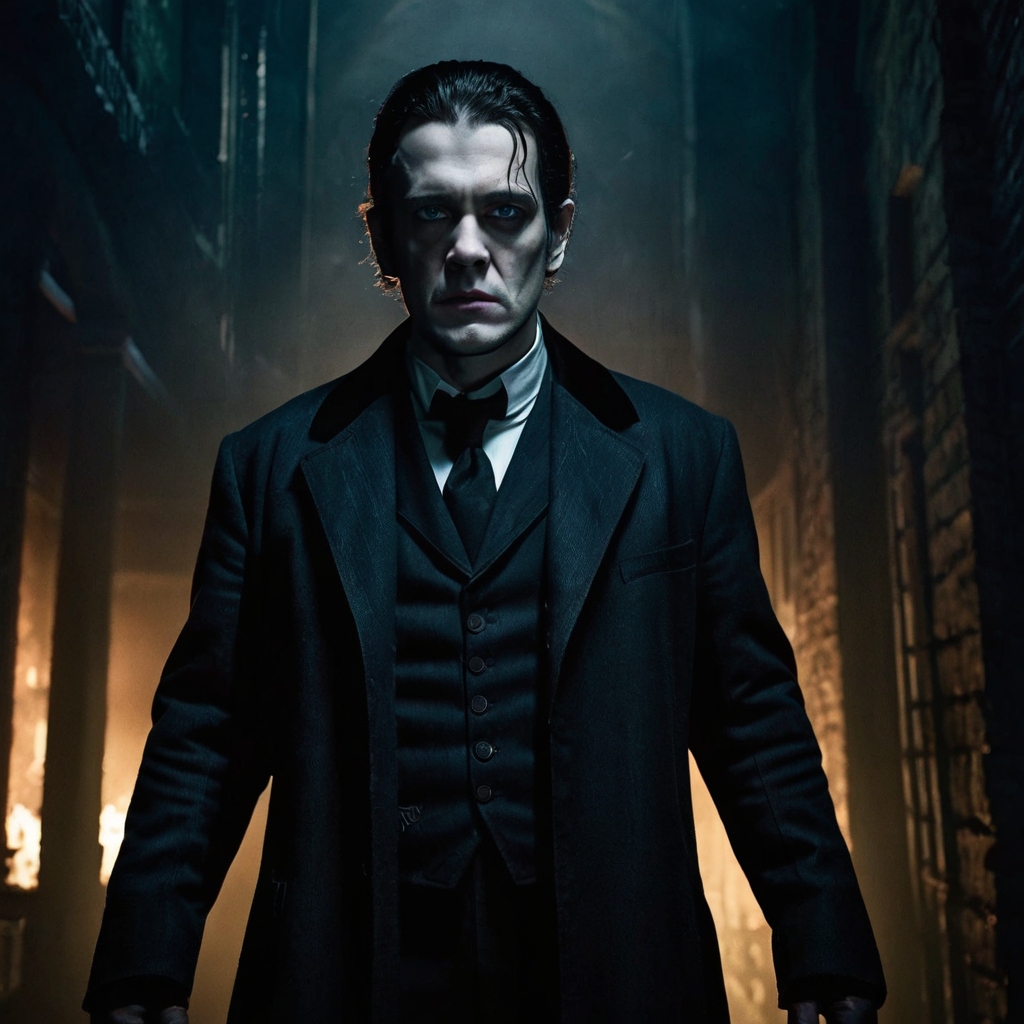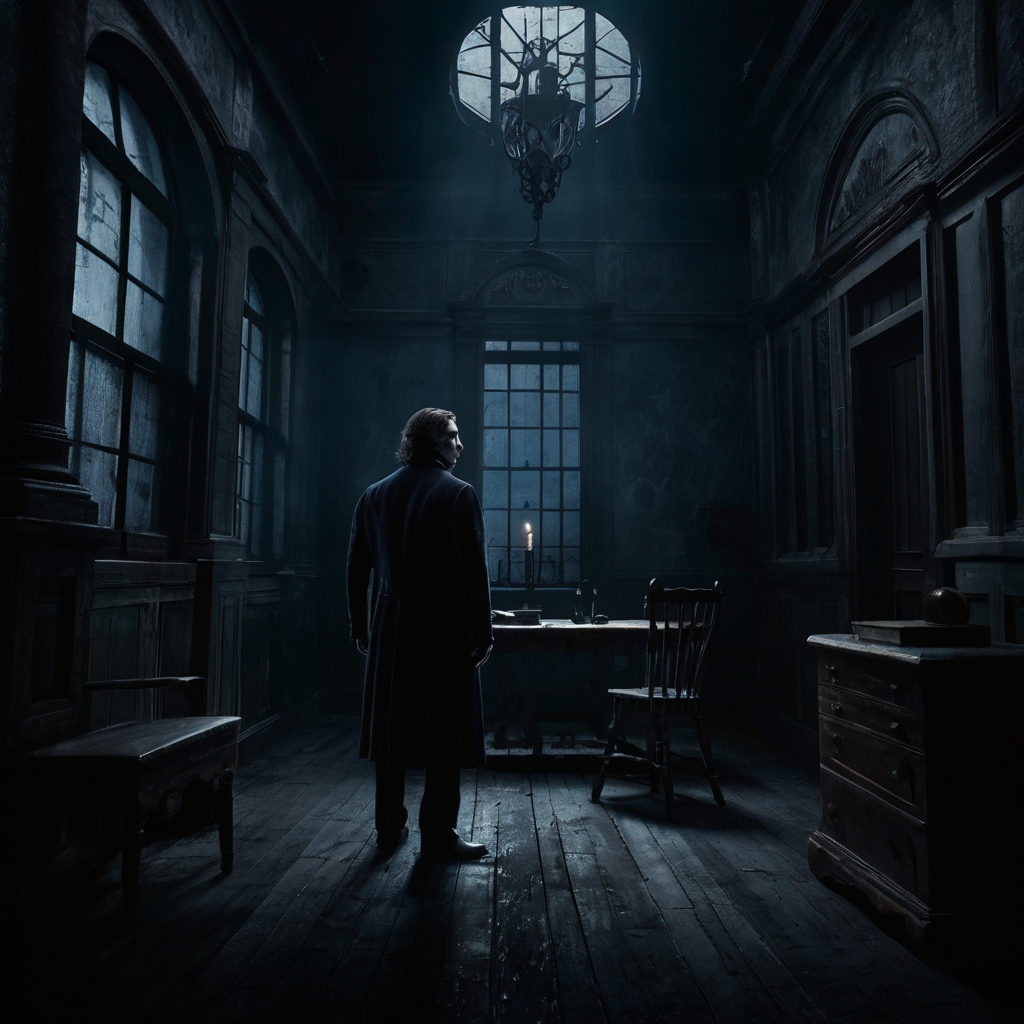Mary Shelley’s iconic monster may have been born from a spark of lightning, but his tormented soul is what makes him truly terrifying.
As we delve into the depths of Victor Frankenstein’s psyche, it becomes clear that the lines between creator and creation are perilously blurred.
Through an in-depth examination of Mary Shelley’s masterpiece, “Frankenstein,” we’ll explore the psychological transformation of its iconic protagonist – from brilliant scientist to guilt-ridden monster.
Unraveling the Monster Within – The Role of Guilt in Frankenstein’s Downfall
Your inner turmoil is a heavy burden, one that can be difficult to shake off. Victor Frankenstein’s story serves as a cautionary tale of how guilt can consume and destroy even the strongest among us.
Guilt is a powerful emotion that can twist your mind in ways you never thought possible. For Frankenstein, it begins with his creation – a being so grotesque that he is forced to abandon it due to its horrific appearance. This initial rejection sets off a chain reaction of feelings of inadequacy and responsibility, which soon escalate into an all-consuming sense of guilt.
As the weight of this emotion grows, Victor becomes increasingly isolated, unable to shake off the feeling that his creation’s date is somehow his fault. His obsessive pursuit to revive it only serves as a desperate attempt to atone for past mistakes, but ultimately leads him down a path of destruction.
Your own mind may be plagued with dark thoughts and emotions, reminiscent of Frankenstein’s inner turmoil. If you are experiencing overwhelming feelings of guilt, your mental state can become muddled and confused. It is crucial to address these emotions head-on in order to find peace and closure.
A Monstrous Mindset – How Childhood Experiences Shape Frankenstein’s Personality
Victor Frankenstein’s psychological transformation throughout Mary Shelley’s novel is deeply rooted in his tumultuous childhood experiences. His early loss of motherhood at a young age sets off a chain reaction that shapes his psyche and fuels an obsessive pursuit of knowledge.
Childhood Experiences and Emotional Baggage:
Victor Frankenstein’s early loss of motherhood had a profound impact on him. The sense of abandonment and rejection that followed created feelings of inadequacy, leading to low self-esteem that persist throughout the novel. His struggles with social interactions due to shyness or anxiety are also revealed in his first encounter with Elizabeth Lavenza, where he is humiliated by her father for not being able to pay his debt. This incident showcases Victor’s vulnerability and sets the tone for a lifetime of emotional turmoil.
Parental Influence: Victor’s father is portrayed as distant and cold, contributing to his feelings of isolation. This lack of connection could have shaped Victor into an introverted individual who compensates for these voids with intellectual pursuits. Moreover, his father’s disapproval might have fueled Victor’s need for recognition and control, leading him to take matters into his own hands.
The creation of the creature can also be seen as a manifestation of this paternal influence. By attempting to play God and usurp power over life and death, Victor seeks to overcome feelings of inadequacy stemming from childhood abandonment. However, this endeavor ultimately leads to chaos and destruction.
Impact on Mental Health:
Victor’s relentless pursuit of knowledge becomes an all-consuming force, driving him down a dark path from which there is no return. This fixation stems not only from his need for recognition but also as a coping mechanism for deep-seated emotional scars. The trauma caused by the loss of his mother and societal rejection sets off a chain reaction that culminates in Victor’s psychological collapse.
Moreover, the pressure to create life can be seen as an attempt to fill voids left by past experiences. This act not only amplifies Victor’s obsession but also puts him at risk of succumbing to madness. The novel highlights how some people are born into their circumstances while others shape them; for Victor, his childhood experiences have irreparably altered his mental landscape.
The Blurred Line Between Good and Evil – Exploring the Nature of Victor’s Morality

Victor Frankenstein’s obsessive pursuit of creating life raises fundamental questions about morality and responsibility.
His relentless drive to bring forth a being from inanimate matter is both fascinating and terrifying, revealing the darkest corners of human ambition. This singular focus on creation sets off a chain reaction that leaves no room for innocence or goodness, as those around him begin to experience the devastating consequences of his actions. His love for Elizabeth becomes increasingly entwined with his creation, leading to feelings of desperation and guilt.
As Victor succeeds in animating the creature, he is left grappling with the moral implications of playing God. Is this a triumph of science or an affront to nature? Does creating life grant him control over his being’s actions, or does it merely unleash a force beyond human understanding? The ambiguity surrounding these questions underscores the complexity of Victor Frankenstein’s character development.
Through his psychological transformation, Mary Shelley masterfully exposes the blurred lines between good and evil. This dichotomy serves as a cautionary tale about the dangers of unchecked ambition and the importance of considering broader ethical implications. By exploring this nuanced theme, we are compelled to reexamine our own values and responsibilities in science, technology, and creative endeavors.
In examining Victor Frankenstein’s psychological transformation, we begin to see that morality exists on a spectrum with shades of gray rather than black-and-white boundaries. This realization invites us to confront the darker aspects of human nature and the importance of introspection. By probing into Victor’s psyche through his creation story, we are encouraged to reflect upon our own capacity for empathy and compassion, as well as the gravity of scientific advancements in understanding life.
As this psychological exploration unfolds, it becomes clear that Victor Frankenstein’s tale serves as a potent reminder: even with the most well-intentioned efforts, unintended consequences can arise. This tragic consequence underscores the need to engage critically with our own motivations and actions lest we risk unleashing forces beyond our control.
Dealing with Unwanted Consequences – Understanding the Psychology Behind Frankenstein’s Revenge
Victor Frankenstein’s descent into madness and vengeance is a testament to the psychological depths that can drive individuals towards destruction. Guilt and inadequacy, fueled by Elizabeth’s death, propel Victor on a quest for retribution against those responsible – albeit an unrelenting need for control over his monstrous creation.
In Mary Shelley’s portrayal of Victor Frankenstein, we witness a complex emotional landscape where the weight of responsibility becomes crushing. The tragic tale unfolds as he grapples with the moral implications of creating life and grappling with the consequences that follow. For instance, after Elizabeth’s demise, Victor is consumed by an overwhelming sense of regret over his creations’ fate. This anguish drives him to make rash decisions that further exacerbate his emotional turmoil.
The psychological impact of bringing a being into existence becomes apparent through Victor’s increasingly obsessive behavior as he tries to undo the perceived wrongs committed against his beloved Elizabeth. For example, when Elizabeth dies due to the creature’s attack, Victor is overcome with grief and senseless rage, exemplifying how unresolved guilt can lead down an abyss of destructive tendencies.
Victor Frankenstein serves as a cautionary tale that illuminates our inner struggle to maintain control over creation while grappling with responsibility for the unintended consequences. The tragic character study in Mary Shelley’s novel reminds us of the human condition, highlighting how internal turmoil can escalate into chaos when unresolved emotional trauma is left unchecked.
As we reflect on Victor Frankenstein’s journey, we may find ourselves drawn to parallels between his psychological state and our own experiences. For instance, research has shown that individuals who struggle with feelings of guilt and inadequacy are more likely to exhibit aggressive behavior. This insight underscores the significance of addressing unresolved emotional turmoil in order to prevent further destruction.
Consider exploring how Mary Shelley employs themes from classic literature or philosophical works like Schopenhauer’s concept of “the abyss” where humans can become lost within themselves, creating a vicious cycle that perpetuates harm and ultimately leads individuals into self-destruction. This deeper dive could make the analysis more relatable and impactful for readers.
Victor Frankenstein is often used to illustrate our fear of losing control over creation while grappling with responsibility – yet what if we looked beyond this trope? By examining how Victor’s actions reveal a struggle between his desire for revenge and remorse, we may gain a better understanding of why personal growth becomes challenging in cases where unresolved trauma dominates the narrative.
Father-Son Dynamics and the Science of Creation
Victor Frankenstein’s character has been extensively studied for his paternal complexities, revealing a deep-seated struggle with power and creation. In creating life from non-existence, Victor embodies the paradoxical desire to defy nature while being bound by his own humanity. This tension is exemplified in his relationship with William, where we witness a father-son dynamic marred by loss and abandonment.
The complex web of relationships that bind Victor’s character also highlights the weight of unfulfilled paternal duties. Take, for instance, his interactions with Henry Clerval or Justine, these connections reveal a deep-seated need for validation and connection that stems from an unresolved desire to provide nurturing care. His creation is not just a scientific pursuit but a manifestation of this longing.
A psychoanalytic examination of Victor’s psyche yields fascinating insights into the psychological mechanisms driving his actions. Attachment issues, triggered by early loss, shape his emotional regulation strategies and contribute to an intense need for control over life itself. His creation becomes a means to reconcile these unresolved traumas while attempting to rewire fate according to Victor’s own paternal blueprint.
Robert Walton’s narrative serves as a poignant reflection of Frankensteins inner turmoil, offering us glimpses into the complexities of human relationships through the lens of existential dread and scientific curiosity. As their paths intersect, we witness a clash between Victor’s obsessive pursuit for control over creation and his deep-seated fear of abandonment by those closest to him be it Elizabeth Lavenza or Robert Walton himself.
In analyzing these paternal dynamics within psychoanalytic theory’s framework, we can explore how the novel reflects Mary Shelley’s unique context. The cultural climate in which she wrote
resonates with 19th-century societal anxieties around reproductive control and scientific inquiry, informing her employment of psychological theories to illuminate Victor’s internal struggles.
Furthermore, examining the text through this lens illuminates his inner turmoil more profoundly. What seems like a simplistic drive for knowledge is instead rooted in unresolved paternal concerns that are never fully addressed throughout the novel.
In refining these ideas further: delve into how different relationships reflect specific emotional responses and psychological mechanisms at play, fear of loss, abandonment by those closest to him, or unmet expectations.
Identity Crisis in a Created Being – The Monster’s Quest for Humanity

Victor Frankenstein is often seen as an anti-hero, but his psychological transformation is rooted in a deeper exploration of what it means to be alive and human. His character embodies the complexities of existence through its internal struggle to reconcile its primal desires with a deep longing for connection.
The monster’s identity crisis stems not only from its rejection by Victor Frankenstein but also from its lack of understanding about human emotions. In Chapter 5 of Mary Shelley’s novel, Victor says: “I had worked hard to acquire a knowledge of nature and its secrets… But I was still an outcast in my family, and an orphan on earth.” This emotional turmoil is further exacerbated by the creature’s monstrous form, a physical manifestation of its isolation.
He is torn between his desire for control over the monster (a primal urge) and a deep longing for connection with another being. Have you ever felt like an outcast? Have you struggled to find your place in society? These are questions that Victor Frankenstein asks himself as he navigates this dark reality, where fear and hostility lurk around every corner.
Through his narrative, we see the blurred lines between creator and creation, challenging traditional notions of identity and human connection. The monster’s relentless pursuit of humanity serves as a profound reminder that empathy is crucial not only in forging connections but also in mitigating fear. As Victor Frankenstein grapples with these questions, he uncovers a deeper truth: acceptance is essential for healing emotional wounds.
In this introspective exploration, we can gain valuable insights into the human psyche. We see that our worth and identity are not defined by how others perceive us; rather, it’s our capacity to form connections that truly define us. Frankenstein’s journey serves as a poignant reminder of the importance of compassion in breaking down barriers between humans.
This nuanced exploration has far-reaching implications for both ourselves and those who may seem different or threatening to others. By examining Victor Frankenstein’s character through this lens, we can foster a more inclusive understanding of what it means to be human.
Obsession and Possessiveness in Love – Victor’s Struggle to Connect with Elizabeth
Victor Frankenstein’s love for Elizabeth Lavenza has become an all-consuming passion that threatens his very being, revealing the darker aspects of human emotions in this iconic novel by Mary Shelley. His obsessive nature and possessiveness towards her are symptoms of a deeper psychological struggle.
Take Victor’s fixation on finding a way to restore Elizabeth after her tragic demise; it’s a prime example of how his love has descended into madness. In one particularly haunting scene, Victor is seen pacing back and forth in front of the crypt where she lies, muttering prayers and making desperate appeals for her return. This desperation reveals the devastating effects of his all-consuming passion.
As Victor becomes increasingly consumed by his desire to bring Elizabeth back to life, he begins to exhibit erratic behavior that’s both fascinating and terrifying. His actions are driven by an intense desire to protect and control those around him – a trait eerily similar to the way he treats his creation.
Let’s be real; when you’re this invested in something (or someone), your grip on reality starts slipping. This is exactly what happens as Victor’s obsessive behavior takes hold, leading to tragic consequences that expose the darker aspects of human nature.
Victor’s fixation also mirrors a more universal theme – our own desperate attempts to preserve loved ones and prevent loss from striking again. But when this desire crosses into obsession, it can have catastrophic outcomes that challenge our perceptions of love and morality.
As Victor navigates his inner turmoil, we witness the psychological transformation taking place in real-time. His actions become increasingly paranoid and isolated as he becomes fixated on reanimating Elizabeth’s lifeless body. This intense emotional struggle culminates in a shocking revelation: what does it mean to truly bring someone back from the dead?
This analysis of Victor Frankenstein’s obsessive love serves as a cautionary tale about the dangers of unchecked emotions and their devastating consequences.
Guilt by Association – How Responsibility Affects Victor’s Descent into Madness
Guilt by association is at the root of Victor Frankenstein’s downfall. When he created life, it symbolized his desire for control and power, as well as fear of rejection or responsibility.
As Victor grapples with the consequences of his actions, guilt creeps in – intensifying when he realizes he cannot take away a creation that has escaped. Imagine being tasked with creating a complex software system that could potentially harm millions if mishandled; you might feel an overwhelming sense of responsibility and anxiety about its stability.
His obsession with Elizabeth’s death becomes an all-consuming force, driving him further into isolation. You may find yourself feeling similarly burdened by your own creations: whether it’s a project at work or personal projects. For instance, imagine dedicating years to developing a new social media platform; you might become so invested in its success that you neglect relationships with friends and family.
Victor is forced to confront the moral implications of his actions – and this confrontation fractures his sense of identity. Consider working on a high-stakes project at work: should you take risks that could lead to failure, or play it safe? Would playing it safe mean sacrificing your professional ambitions?
By examining Victor Frankenstein’s story through the lens of guilt by association, we can gain valuable insights into our own decision-making processes. For example:
- When working on a new business idea, consider how you weigh risks and potential rewards.
- Should pursuing one passion come at the cost of another.
This anxiety about creating something that could bring harm to others is amplified when Victor realizes he cannot control his creation. It’s not unlike being responsible for a child; every decision seems more significant and fraught with worry.
Let’s explore what this looks like in real life: imagine your best friend coming to you after a major business failure . Would it be too much pressure on you? What does guilt by association feel like?
This anxiety about creating something that could bring harm is amplified when Victor realizes he cannot control his creation. It’s not unlike being responsible for a child; every decision seems more significant and fraught with worry.
Let’s explore what this looks like in real life: imagine your best friend coming to you after a major business failure . Would it be too much pressure on you? What does guilt by association feel like?
To avoid falling into Victor’s trap, try these strategies:
- Identify your triggers for guilt by association and proactively address them. For example, when working late nights or taking excessive risks in the office.
- Break down complex problems or fears into manageable tasks to prevent feeling overwhelmed.
By examining this concept through a narrative lens, you can develop valuable insights into how guilt by association influences decision-making processes – both in your personal life and professional endeavors.
Rebellion Against Nature – Examining the Consequences of Playing God
The creation of life from inanimate matter is perhaps Victor Frankenstein’s most infamous act, but it also reveals a profound psychological transformation. By defying nature’s laws and conventions, he unleashes a being that challenges traditional notions of morality and his own sense of purpose. As he gazes upon the creature, Victor is beset by an overwhelming sense of dread and responsibility.
This moment marks a turning point in Victor’s journey from scientist to creator, as he grapples with the ethics of playing God. The weight of this responsibility begins to erode his sense of identity, leading him down a path of isolation and self-doubt. His creation sparks an existential crisis within him, leaving him questioning the boundaries between creator and creation.
This phenomenon is particularly relevant through the lens of existentialism, which posits that humans are fundamentally free beings who create their own values and meaning in life, not bound by any rules or laws imposed externally. For example, Jean-Paul Sartre’s concept of “bad faith” suggests that individuals often engage in self-deception to avoid taking responsibility for their actions. Victor Frankenstein’s creation serves as a prime example of this phenomenon, as he struggles with the moral implications of his life’s work.
Some argue that humans have always been rebels, pushing boundaries and defying convention through art, science, or philosophy. However, others point out that this behavior is actually a form of self-fulfilling prophecy . By rebelling against nature’s laws, we often inadvertently reinforce those very same rules. This tension between rebellion and conformity highlights the complexities of Victor Frankenstein’s character.
As his creation grows stronger and more intelligent, Victor becomes increasingly withdrawn from friends and family. His obsessive pursuit of knowledge takes a toll on his mental health, leaving him feeling like he is losing himself to the monster he created. He begins to question whether he has made a terrible mistake, one that will haunt him for eternity.
This inner turmoil culminates in a tragic confrontation between Victor and his creation, as they clash over their vastly different perspectives on what it means to be alive. In doing so, Frankenstein forces us to confront the darker aspects of our own nature: What does it mean to create life? To love or to destroy?
By exploring the psychological implications of rebellion against nature through existentialism, we can gain a deeper understanding of Victor Frankenstein’s complex character and his place in literature as a whole. His story serves as a cautionary tale about the dangers of playing God and the blurred lines between creator and creation that often accompany it.
Unraveling the Tormented Soul: Exploring Victor Frankenstein’s Psychological Transformation
The Power of Revenge – Understanding the Psychology Behind Frankenstein’s Actions
Great literary characters don’t become monsters by accident, they are forged through a complex mix of circumstances and emotions. The more deeply we understand Mary Shelley’s classic novel, the clearer it becomes that Victor Frankenstein is driven by an insatiable quest for revenge against his creator and the world.
The psychological dynamics at play in Frankenstein’s narrative make him both fascinatingly human-like and terrifyingly monstrous. His relentless pursuit of scientific knowledge drives a wedge between reason and emotion, creating a chasm so deep that it cannot be bridged without destruction.
Understanding this toxic interplay allows us to see beyond the monster’s grotesque appearance to its tortured soul. The power of revenge is what transforms Frankenstein from an ambitious scientist into an instrument of chaos.
Take time today to delve deeper into the depths of human psychology, and discover how a single spark can set off a chain reaction that will haunt you for eternity.
Unraveling the complexities of human nature is essential in this modern era where we are constantly bombarded with news about horrific crimes.



